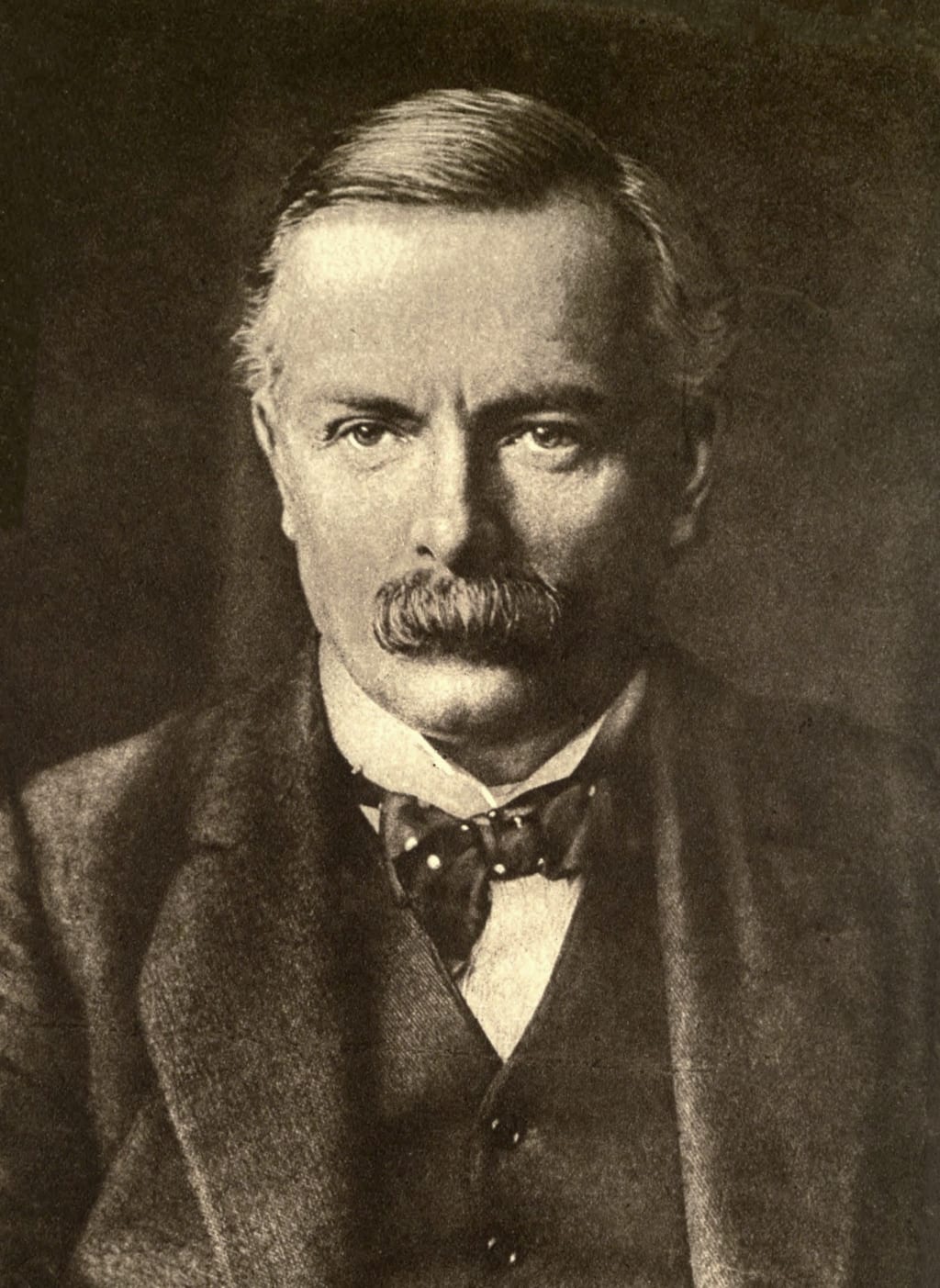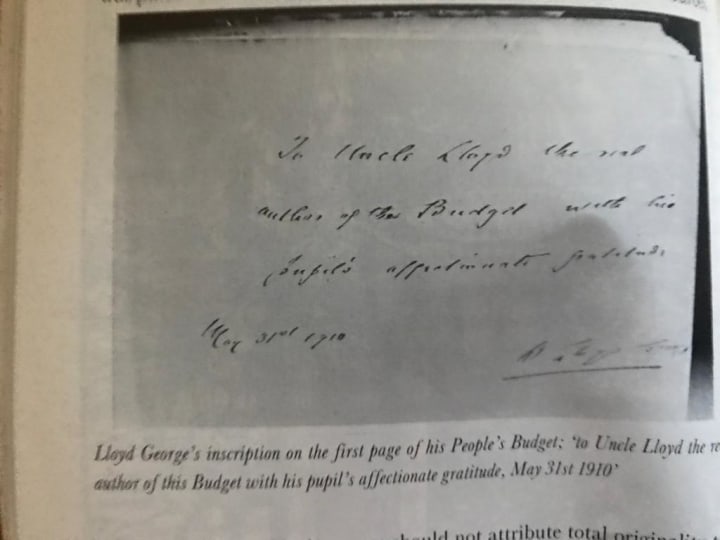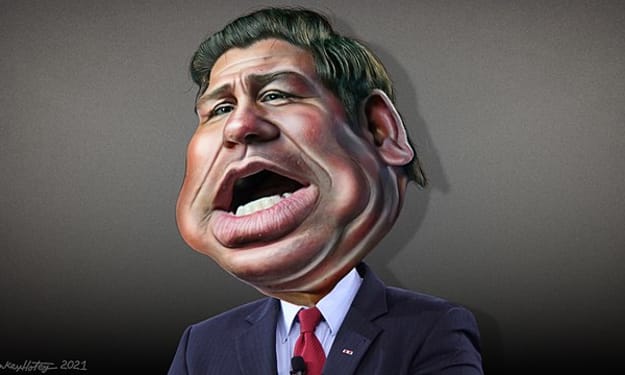David Lloyd George: The Great Dynamic Force or The Great Scoundrel of British Politics?
He had very little formal education, never knew his father, and yet rose to the very top of British politics, holding two major offices of state, selling peerages (Lordships), and engaging in insider trading along the way. A man like no other, in British political history, who was David Lloyd George?

David Lloyd George was born in Manchester on the 17th of January 1863, Manchester. He was brought up from the age of three months in rural wales. His father, William George, who worked as a teacher in Liverpool, moved back to Wales on account of his ill health, passed on in June 1864. This led his mother to move to her brother's, who worked as a shoemaker.
It was his uncle, Richard Lloyd, who would have a profound effect on the subject's entire life and life choices. Firstly, with his training as a solicitor and subsequently as a Liberal member of parliament for Caernarvon boroughs from 1890- till his demise in 1945.
Back Bench MP and Opposition Spokesman: 1890–1902
Our hero works as a spokesperson on welsh affairs and other bits of jobs here and there. But it isn't until he speaks out against the war being prosecuted by Britain against the Dutch in control of the Republic of South Africa, that he really bursts into the national consciousness.
Given that Imperial fervor was at an all-time high in the late 19th century, being pro-Boer, that is to say anti-war, was a deeply unpopular move and he is nearly lynched in Birmingham and only escapes by wearing a disguise. His future colleague on the liberal benches, Winston Churchill, (only after crossing the floor from the conservatives in 1904) was captured as a prisoner of war and his dramatic escape from the clutches of the Boers greatly increased his popularity which led to his election as a member of parliament for Oldham in 1900. we will touch on their friendship a little later.
President of the Board of Trade and Chancellor of the Exchequer (1905–1915)
By the time Henry Campbell-Bannerman won a majority, returning the liberal party to power, Lloyd George became the President of the board of trade- a position known today as the Minister of Trade and Industry.
It wasn't until the demise of Prime Minister Bannerman in 1908, leading to Asquith becoming Premier, that we see Lloyd George in action when he is appointed the Chancellor of the Exchequer (Finance Minister).
The People's Budget of 1909
The raison d'etre of the people's budget was to transform the social order, which he thought could be done by raising taxation on the wealthiest in society. So radical was the notion of higher taxes was at the time that the senior conservatives denounced it and it was rejected in the house of lords, (Britain's unelected upper chamber). This led to two things:
- Creation of new peers by the Liberal party.
- Reform of the house of lords, thereby curtailing its power. (Parliament act of 1911)

These steps led to the passing of the people's budget in the house of lords and there began the social policies at the bridging of the gap between the haves and have nots in British society. Richard Lloyd who had inspired this radicalism in his nephew is credited as the author of the people's budget.
Inscription dedicating the people's budget to his uncle, Richard Lloyd. from Michael Lynch's the Liberal Dilemma.Introduction of Health Insurance
To replicate what had been put in place in Von Bismarck's Germany, Lloyd George had asked a civil servant called Braithwaite to go to the country to see how it might be adapted in Britain. What was implemented would lay the groundwork for the much broader version that Clement Atlee's Labour party would put together in 1945.
Introduction of wages for British Members of Parliament
Prior to Lloyd George's initiative, MPs had to have other means of income as they drew no salary from their job representing their various constituencies, once this was legislated into law, members have continued to vote to give themselves pay rises, ever since.
Insider Trading of Marconi's Shares.
This is one of the stories that has been lost to history, but it must be pointed out, but this was perhaps the closest to ending Lloyd George's career. The staunch defence of his political allies helped him weather the storm, even though there was a somewhat clear indication that he had profited from the impending contract due to be awarded to the telecommunications giant, Marconi.
The First World War and The Ministry of Munitions
Having made a huge difference to the lives of the British public in his time as its Chief Finance Officer, David Lloyd George resigns his appointment in 1914 and becomes the Minister of Munitions. This is due to the commencement of the great war and the need for Britain to ramp up its production of dreadnoughts.
Having pointed out that Winston Churchill had crossed the floor from the conser vatives to the Liberals in 1904, Churchill's career trajectory seemed to run in tandem with his great friend, Lloyd George's. Churchill, from initially serving as the under secretary for the colonies under Lord Elgin, President of the board of trade, Home Secretary and most importantly, First Lord of the Admiralty. At this point, Lloyd George and Churchill are seen as the most radical politicians in Britain. An interesting case in point is the quote by Lord Curzon that " all civilizations are the hard work of the aristocracy" to which Churchill replied, that "the upkeep of all aristocracies, has been the hard work of all civilizations".
At the time of taking the office of the helm of munitions, he found one table, three chairs, far too many mirrors and no secretaries in a hotel, by the end of the war in 1918, the ministry had over 200,000 civil servants and had three million workers. Such was his prodigious energy and dynamism, which set the stage for his next career move.
By 1915, There was a pervasive discontentment with Britain's prosecution of the great war. Herbert Henry Asquith, the war prime minister was seen as lacking the energy and dynamism needed to overcome Germany. The conservatives were sounded out by the faction loyal to Lloyd George and they were willing to continue supporting the coalition government but under the following conditions:
Not under Prime Minister H.H. Asquith.
No Cabinet place for Winston Churchill. (He was forced to resign due to the heavy casualty toll from the Gallipoli disaster and still wasn't forgiven for his speech denouncing the conservatives and joining the liberals).
Realizing that he had very little support among his backbenchers to carry on as Premier, Asquith went to see King George V tender his resignation and Lloyd George is called in to form a coalition government with the conservatives in December 1916.
Prime Minister of the United Kingdom and First Lord of the Treasury.
David Lloyd George, the son of rural wales, of limited formal education, who spoke Welsh as a first language, had risen to the highest office in the land- The Prime Minister of the United Kingdom and Ireland and the First Lord of the Treasury.
As soon as he was done kissing the King's hands, Lloyd George set about transforming government by making government efficient for the first time. This entailed creating a war cabinet of five or six members and providing it with a secretariat. Cabinet minutes were taken and distributed, thus ensuring that people knew what the cabinet had decided and what was going to be carried out.
Lloyd George was not only able to give orders, but receive, for the very first time clear and competent guidance as to the basis, the figures, on which these orders were given. With the command of figures and his ability to mobilize the nation and industry and in introducing what the people rightly termed 'war socialism' he was a highly successful wartime leader.
The end of the great war in 1918, greatly enhanced his position and in the following elections, known as the "coupon election" in which coalition candidates were given a coupon signed by Lloyd George and his conservative deputy, Andrew Bonar Law( born in Canada and raised in Glasgow from the age of 12).
The coalition government won a landslide majority, as expected, and took a leading role in ensuring that Germany wasn't heavily penalized for waging war with the rest of the West. His voice was of moderation and generosity unlike Georges Clemenceau of France and Vittorio Orlando of Italy. John Maynard Keynes' magnum opus on both sides of the Atlantic, the economic consequences of peace seemed to chime with Lloyd George's view.
His resolution of the long-standing Irish home rule was yet another feather in his already excessively decorated cap. As late as 1921, he was still viewed as a supremely successful leader, yet in 1922, just as he was angling for another war, this time with the Turkish, during the Chanak crisis, the conservatives broke away thus ending the coalition government.
Why did this happen?
It seemed for a time that Lloyd George would split the conservative party in the way that he split the liberals. For Lloyd George, his political reason for being was the constant sense of upheaval, the need to turn things on their head, reinventing the wheel, wherever and whenever possible and the nation after having endured the trauma of the great war simply pined for a quiet life.
At conservative big wigs meeting prior to the collapse of the coalition government, Stanley Baldwin made a few remarks about his soon to be erstwhile colleague which was recorded for posterity:
David Lloyd George is a great dynamic force, but a dynamic force is a destructive force.
David Lloyd George's Legacy
The inexorable rise of David Lloyd George to the very top of British politics especially given his very humble origins, his little formal education in a field mostly dominated by public school educated Oxbridge types is all the more extraordinarily remarkable.
Unlike James Ramsey McDonald(born illegitimately and working-class origins)of the Labour party who owed his rise in British politics to the working class movements, Lloyd George was a self-made man in the strictest sense of the word, whose rise was entirely due to his industry, prodigious energy, dynamism, creativity and willingness to sacrifice his principles at the altar of political expediency.
At his eulogy, his old friend and fellow radical during the halcyon days of the liberal party, Winston Churchill, now prime minister of a coalition government of 1940–45 said the following:
When the history of the first quarter of the this century comes to be written, it would be found that we owe more to Lloyd George than to any other one man.
And we can say not only in the first quarter of the century, even at the present day, many of our modern institutions, the welfare state itself, we owe to Lloyd George, Health insurance, the National Health Service-Lloyd George; Unemployment insurance-Lloyd George; Housing as a public service -Lloyd George; Ireland as a contented and friendly neighbour-Lloyd George; the victory of the First World War-Lloyd George, the man who won the war.
These glowing words from Churchill notwithstanding, we must appreciate that the truth about Lloyd George was altogether complex- someone who was prepared to throw anyone under the bus to achieve his political gains- as Dr. Addison would find out to his huge disappointment. Someone who engaged in insider trading and still lied to his political allies that he had acted with propriety. someone who kept a mistress- Frances Stevenson- and in all likelihood fathered a child with her. Not also forgetting that he sold peerages to those who were desperate to buy them and was prepared to jump from one political position to another and yet claim consistency in his actions.
David Lloyd George: A great dynamic force or the great scoundrel of British politics, you choose….
Thanks for reading
References
1.Alan John Percival Taylor: British Prime Ministers.
2. Winston Churchill: The speeches of Winston Churchill.
3.Michael Lynch: Lloyd George and the Liberal Dilemma.
4. Countless documentaries on the BBC on Lloyd George.
5. John Maynard Keynes: The Economic Consequences of Peace.
About the Creator
Adebayo Adeniran
A lifelong bibliophile, who seeks to unleash his energy on a number of subjects






Comments
There are no comments for this story
Be the first to respond and start the conversation.